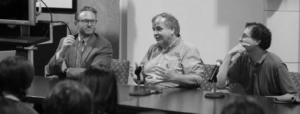by The Cowl Editor on October 24, 2019
Opinion

by Julia McCoy ’22
Opinion Staff
With an election year on the horizon, it is not uncommon to hear politics being discussed on Providence College’s campus. In fact, there are many opportunities to do so provided by the College throughout the year.
Especially in a particularly polarized world, there are bound to be debates and conversations regarding politics at PC. One way for these issues to be discussed is through involvement in either Providence College Democrats or Providence College Republicans, the two clubs on campus with political affiliations.
PC Democrats and PC Republicans are great organizations that embolden party members and provide great outlets for students on campus who feel more strongly about politics than their peers. They are a great opportunity to run events on campus, including the debates, and helping with voter registration.
In these clubs, students are welcome to discuss their political views within a given party. Debates are held and students remain divided on most issues. But what PC does not offer is a club that disregards the party lines and discusses issues on a non-partisan level.
It is hard to imagine that many students—especially early on in their tenure at PC—have much experience with politics. Coming in at eighteen years old means that students have likely only voted in a handful of elections, if that. College should be a place to cultivate and discuss these beliefs.
But what about those students who do not yet have a political affiliation? Or those who do not fall fully on either side of the aisle? Many students may feel forced to “pick a side” in order to participate in these political discussions, but that should not be the case. There should be a place on campus that is willing to discuss issues in a less polarized manner.
Pizza and Politics, sponsored by the Board of Programmers and the political science department, is a great start to this initiative. It provides students who may not be involved in the political science department the opportunity to hear about today’s politics from experts.
This event, though it does not meet as often as a regular club meeting, helps students remember that there is a world outside of our campus, and that it is important to be involved in that world. The involvement of professors, however, makes the event seem more informational and less of a discussion than some students may like. Regardless, this event is incredibly important on campus as it gives students access to new perspectives.
In addition to Pizza and Politics, PC should offer a club for students to have similar types of discussions among themselves. The information and conversation students have with their peers may be more relatable and easier to understand. Similarly, students are often concerned with the same areas of issue and are able to discuss what they know with each other.
This would give students an introduction to politics and the ability to craft opinions and arguments that they had not yet been privy to. It can also be an important way to remind students of the world outside of campus, one that is defined by political struggles.
In today’s society, due to the intense polarization of party lines, many people are choosing to register with no party affiliation. Oftentimes, students feel pressure to choose a party because the media showcases the two parties as one or the other. It is important for people to know it is completely normal to have inclinations toward both left and right ideas, and this should be celebrated on and off campus.
Those students are in need of an outlet as well. Though they may have strong thoughts about politics, they may not be able to choose which club—PC Democrats or PC Republicans—is most suitable for their opinions. PC should encourage these conversations as much as possible and make sure that students are engaged in the politics around them.
After graduation, students will be entering into a world where issues such as politics are discussed in daily life. A college campus is a great setting to practice these discussions and craft your own personal opinions and affiliations. The College should offer more places in which these ideas can be discussed without feeling pressure from either side of the aisle.